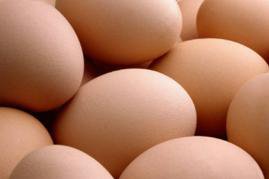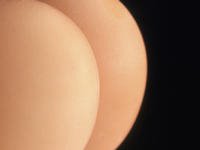 Today, if we eat eggs at all, we almost always eat hens’ eggs, though the eggs of other fowl - including duck, goose and quail - are getting popular again.
Today, if we eat eggs at all, we almost always eat hens’ eggs, though the eggs of other fowl - including duck, goose and quail - are getting popular again. Any egg should be worth a try however I did find the turtle eggs a bit more dry and gritty. An eggshell's colour is determined by the breed of bird (let’s forget the reptiles for now) that laid it and has nothing to do with either taste or nutritive value.
Eggs should always be refrigerated (and it’s best to store them large-end up) because when stored at room temperature they lose more quality in 1 day than in a week in the fridge so always keep them there and still in their carton; this helps prevent any possible damage but also avoids tainting because they can easily absorb odours especially from odoriferous foods (such as onions...onions...O...thinks...). Providing the shells are intact they can be refrigerated up to a month but the best flavour (and cooking quality) will be realized in eggs used within a week.
The egg is a nutritious, delicious food in its own right but it also has numerous other uses in ‘everyday item’: they help to leaven cakes, breads and of course soufflés; they provide a base for many dressings, especially mayonnaise; a thickener in sauces and custards and a clarifying agent for stocks etc. but with their significant protein, vitamin and mineral content and relatively low saturated fat content, eggs are most commonly eaten as ‘eggs’ and provide a valuable component in a healthy diet.
Egg protein is of high biological value as it contains all the essential amino acids needed by the human body; they therefore complement other food proteins of lower biological value by providing the amino acids that are in short supply in those foods. A whopping 12.5% of the weight of the egg is protein, which is found in both the yolk and the albumen; although the protein is more concentrated around the yolk there is in fact more protein in the ‘white’. Such is the high value and high digestibility of eggs that they provide a reference standard by which other foods are assessed.
Vitamins and minerals are also abundant: eggs contain most of the recognised vitamins with the exception of vitamin C; they are a good source of all the vitally important B vitamins (riboflavin etc) plus the fat-soluble vitamin A, provide useful amounts of vitamin D, as well as some vitamin E. Eggs contain most of the minerals that the human body requires for health; in particular they are an excellent source of iodine, required to make the thyroid hormone, and phosphorus, required for bone health. The egg provides zinc - good for growth, healing/ fighting infection great for shiny healthy hair and nails etc - selenium, an important antioxidant; and calcium, needed for bone and growth structure and nervous function. Eggs also contain significant amounts of iron, the vital ingredient of red blood cells, but the actual availability of this iron to the body is uncertain as yet...
Eggs contain only traces of carbohydrate and no dietary fibre but 10.8% of the egg content is fat. However, before you spit the dummy and scream “Unhealthy” you should understand that approximately 11% of an egg’s fatty acids are polyunsaturated, 44% monounsaturated and only 29% saturated; I have mentioned fatty acids in other posts and this becomes important when people talk of the ‘badness’ of eggs re cholesterol etc. Go here if you’re interested (from the same eggs and nutrition site) to find out how this really 'unhealthy' claim is not the case at all. The fat of an egg is found almost entirely in the yolk; there is less than 0.05% in the albumen.
Cholesterol and Lecithin (a phospholipid, essential for the metabolism of fats) are fat-like substances and are essential to the structure and function of all cells in the body. Cholesterol helps to maintain the flexibility and permeability of cell membranes and is also a raw material for the fatty lubricants that help to keep the skin supple. Cholesterol is essential for the production of sex hormones, cortisol, vitamin D and bile salts. Lecithin - of which choline is a major constituent - is involved in the general lipid transportation in the blood and in the metabolism of cholesterol.

Yes, you're right: this is the bottom of the post, or is that two eggs?
S.O.
Nutrition
6 comments:
We blew eggs at easter, goose ones. (My grandmother taught me...) Very nice for decorative painting but the omlette was too rich. Also a bit grey...
Hello Ian, yes eggs are great and sausage bacon and eggs is a simple meal fit for a king!...add baked beans and buttered toast and you can do no better, sod the king!
Never blown any egg though, especially not a goose egg like Gavin has...
Also..just in case you ahven't read my archives...no,you haven't ?...:-)...I'm 'into' nutrition and so will intersperse the horny, orgasmic stuff with healthy eating titbits!
...did someone say titbit?
Hi..its candieekisses..thanks for leaving a comment...in response to your question--go to.. http://www.geocities.com/mouthysup/
then click on 'cursors' (in the left column) (my sister did mine for me..sorry i cant be of more help to you) this is what she told me to tell you...have a great day!:)
I absolutely love eggs Span.
I'd say I average about 4 a week.
For me though, only hen or quail will do.
Goose and duck are just too rich, and have that grey colour when cooked. Thoroughly unattractive to the eye.
The best eggs I have ever eaten were in France, laid by the chooks my friend kept. Totally free-range and organic, they were simply the finest thing that came from a birds bottom that I have ever tasted.
My favourite eggs of the moment actually come from Tesco (sorry guys). They are an old English variety called Cotswold Legbar, free-range and organic (won't eat any other kind). The shells are in varying shades of blue! Gorgeous eggs, but about £1.80 for six. So, so worth it though.
The 'bottom' of the post had me chuckling!
K x
Glad you like the picture...of the 'eggs'!
yes, I would advise anyone to eat free.range if they can, normal eggs are nice but those from happy birds eating what nature desighne dthen to eat aste so much better...as you say...birds' bottoms....ahhhh (sighs)
Post a Comment